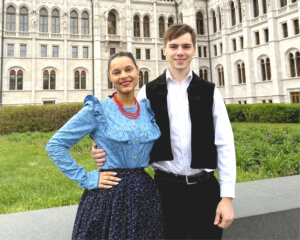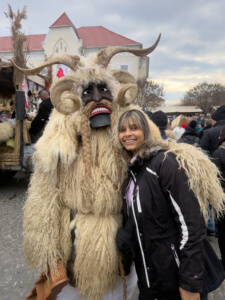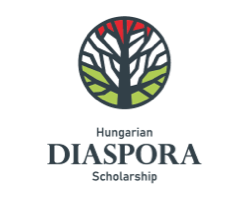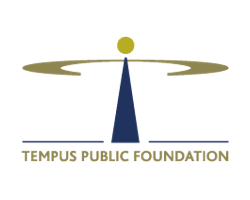
2025-05-07
In this insightful interview, Tisza Fizli opens up about her journey to fluency in Hungarian, revealing how her American-Hungarian heritage has shaped her identity and relationships. Discover how the language has deepened her connections to both her roots and her loved ones, from growing up in a bilingual household to navigating life in Hungary.
Could you tell us a bit about your Hungarian heritage and how your American-Hungarian identity has shaped your connection to the Hungarian language?
I was born in Los Angeles to an African American mother and a Hungarian father, who immigrated to the U.S. in 1992. My family is originally from Budapest, and my father made it his mission to immerse me in Hungarian culture. From a young age, I participated in Hungarian scouts, folk dance, and other cultural events. These experiences helped me stay connected to my heritage, especially the language. My cousins and I all speak fluent Hungarian and have lived in Hungary for some time. We still speak Hungarian to each other, even though we were born in the U.S. Witnessing my younger brother grow up, I realised how important it is to preserve our culture and language, something my dad instilled in us by giving us Hungarian names, Tisza and Hunyad.

Since you didn’t learn Hungarian while studying in Hungary, how did you achieve fluency? Was it through family, community, or formal learning methods?
I owe my fluency to my father, who was determined to teach me Hungarian. Despite our parents’ divorce, he ensured I spoke, read, and wrote fluently by only speaking to me in Hungarian. He made sacrifices, taking me to Hungary every summer and bringing back books and movies. He also enrolled me in Hungarian scouts and dance in California and sent me to a Hungarian scout camp in New York, where I met other Hungarian Diaspora kids. My grandmother, who lived with us for many years, also played a key role in my language learning. She would accompany me to Hungary when my father couldn’t.
My father always told me he’d be at peace if I could teach my own children Hungarian one day, and knowing I can do that now fills me with pride. His dedication and sacrifices were essential to my fluency.

Participating in the lively traditional celebration of Busójárás
How did your fluency in Hungarian impact your experience living and studying in Hungary?
While speaking Hungarian isn’t necessary in Hungary, it definitely makes things easier. People often ask me about the challenge of moving here after growing up in the U.S., and for me, it wasn’t difficult at all. I felt at home right away, largely because I could communicate in Hungarian. Starting university at Corvinus was a similar experience. Although I’m studying in English, speaking Hungarian has helped me connect with Hungarian students and form meaningful friendships. It’s not just about the language, but it definitely plays a big role in building those bonds.
Your boyfriend is Argentinian-Hungarian. How does your shared Hungarian heritage influence your relationship?
Having Hungarian heritage is a key part of my relationship with my boyfriend. Growing up, I always felt that an American partner wouldn’t understand my Hungarian side, and a fully Hungarian partner might struggle with my American background.
But when I met my boyfriend, everything clicked.
We first connected over our shared Hungarian heritage in a language and cultural studies program, and since then, our similarities have only grown. We’re both Hungarian scouts, involved in folk dance, and most importantly, we both speak Hungarian. It’s truly special to be with someone who understands me completely, and together we’re building our life in Hungary.

Tisza with her Argentinian-Hungarian boyfriend, celebrating their shared heritage and unique bond
Have you found that speaking Hungarian has helped you build stronger connections with friends or your boyfriend’s family?
Yes, speaking Hungarian has definitely strengthened my connections with both friends and my boyfriend’s family. While the international community in Hungary is welcoming, speaking Hungarian has helped me build deeper relationships with Hungarian-born friends, allowing me to learn from them and have new experiences.
For my boyfriend’s family, speaking Hungarian has been a huge advantage. His family, who preserved the Hungarian culture across generations, appreciates when I communicate with them in Hungarian. Whether it’s singing folk songs with his mother or discussing Hungarian films with his father, speaking the language has helped me form meaningful connections with them.
What does the Hungarian language mean to you personally? Is it more than just a way to communicate?
To me, Hungarian is everything. It’s a gift I’m incredibly grateful for, thanks to my father and grandmother. Speaking Hungarian connects me to my ancestors in a way nothing else can, and it’s something no one can ever take away from me. I can speak their language, and that feels truly special.
I believe that to truly understand a culture, you must speak its language, and through Hungarian, I feel deeply connected to Hungary.
I’m proud to understand the language, appreciate its poetry, and look forward to passing it on to my children, sharing the gift of language, pride, and belonging.

Tisza takes home the Special Award at the 2025 MentorFactor for her outstanding singing performance
What would you recommend to others with Hungarian roots who want to learn the language?
Hungarian is a challenging language, but it’s worth the effort. With dedication and hard work, you’ll be proud of your progress. When I moved to Hungary in 2021, my roommate was a 33-year-old woman from Brazil who discovered her Hungarian roots and was determined to learn the language. Despite not speaking a word of Hungarian when she arrived, she immersed herself in the language—attending classes, speaking at the grocery store, and watching Hungarian films. After 10 months, she could hold long conversations in Hungarian. My advice to anyone learning Hungarian is to stay dedicated and never give up, just like my roommate did.
Tisza’s story emphasises the deep personal connection and significance of learning the language of her diaspora country. For anyone eager to embark on a similar journey, the Practice Your Hungarian online course provides invaluable support, whether you’re just beginning or seeking to enhance your skills. With practical lessons and expert guidance, it’s the perfect resource for those ready to dive into the language and culture. Begin your own Hungarian language adventure today!






